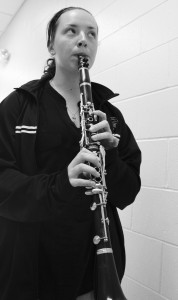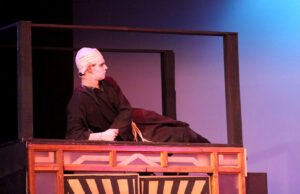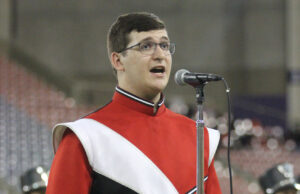All State Auditions: Musicians bring years of practice to day of reckoning at Hampton
Practice doesn’t always make perfect. Students auditioning for the All State Music festival know that their hard work may not be rewarded.
Thousands of students all across Iowa audition for the All State band, orchestra and chorus. After going through the intense and highly selective audition process, approximately 284 students are selected for the All State band, approximately 154 for the All State orchestra and 600 students for the All State choir.
Two-year All State bassoonist senior Josh Carlo has experience participating in both the band and orchestra. “You get about five minutes to warm up. Bassoons get seven minutes just because of how long it takes us to get set up. You go into the room and you play a selection of a prepared piece for about a minute. Sometimes the judge will stop you. It’s a good sign if he doesn’t stop you,” Carlo said. “Then you play selections out of two prepared etudes that you don’t find out until right before you play. There are six cards that have two of the 12 major scales on them. One is considered a difficult scale, and one is considered an easier scale. You play a scale of choice, the two scales and then your chromatic scale. You get ranked by how many points you score. It’s 10 per item.”
Auditioning for the Orchestra is similar to the band, however there are some differences. “They put up which exerpts you’ll be performing and they post the two scales you’ll be playing,”two-year All State bassist Kristen DeSerano said. “Ours are posted before so we know which ones to practice.”
Senior McKenzie Sesterhenn is a two-year All State vocalist. Selection for the All State chorus is unlike selection for the other groups. “You learn music to songs, like seven or so, and you have to know them well enough with your quartet group to be able to perform them, but they don’t have to be memorized, and then you go to Hampton with your quartet and you figure out the passages that you’re supposed to audition on. Then you sing those passages with your quartet in front of one judge,” Sesterhenn said. “Then you go sit in the gym and either wait for a recall or to see if you made it. If you get recalled, you go sing a certain section of a song by yourself to a judge. Then you wait and see if you made it.”
While the audition process may be long and difficult, Sesterhenn enjoys the benefits of being selected. “I like singing with big groups of people, and it’s fun to learn new, challenging music, and I like to be recognized by my achievements, and it’s always fun to go down to Ames with a bunch of people from school for three days.”
All-State judges select the top musicians from all over the state each year. However, even top musicians at the high school don’t always make All State their first few tries. Senior drum major Hannah Niemann said she is hoping to make All State this year for the first time. “It’s like the culmination. It’s pretty much being told that you’re good enough. Just to be able to say that I’m good enough that I made it, and to test myself,” Niemann said.
While Niemann may be practicing an hour a day and is one of the top clarinet players in the CFHS wind symphony, she still has some concerns about the audition. “I’m most worried about nerves and consistency and having enough practice to play with consistency without the nerves messing me up.”
No matter how much someone practices and prepares for All State, sometimes uncontrollable factors such as illness can have a huge impact on the audition. Niemann had experience with this a year ago. “I got really sick, and I couldn’t breathe, and I couldn’t hear anything, so I just went in and did it. It sucked,” Niemann said.
However, with a regimented practice routine and her health, Niemann said she hopes she will succeed this year. “It’s the same thing every year: practice, repetition and lessons with my private instructor,” Niemann said.
Many sophomores have never auditioned for All State before, but they have made other honor bands or choirs in junior high. Lauren Harter is looking to challenge herself after making Opus Honor Choir in junior high. “My older brother did All State when he was in high school, and it just seems like the next step up from Opus,” Harter said.
Auditioning in a quartet requires working around not only one’s individual schedule for practices, but the schedule of three other quartet members. “We just had our first practice last night, and we’re getting together this weekend. I practice on my own about an hour listening to practice tracks on my iPod or going to practice rooms in classes I have nothing to do in,” Harter said.
Even though the audition process is quite intense and involves a lot of practice, junior Spencer Betts said the hard work is well worth it for the experience of being a part of participating in the select choir. “It’s crazy. We arrive on Thursday to have a chance to relax, but when you arrive for the first big rehearsal, it’s crazy. There’s 600 choir kids wandering the auditorium, and it’s really loud. As for the concert, everyone works really hard to get there and everyone gives their all to produce the most incredible sound you’ll hear,” Betts said.
While the experience is exciting, he said it takes a lot of effort in order to make it. “In my opinion it takes a lot of hard work and dedication. Everything goes back to that. Time with yourself and with your group especially. You need to listen to what your group says, what [choir director Eliott] Kranz says and what the director says in the notes you’re given. Also having faith in your quartet, yourself and your abilities is key. If you can’t believe in what you have, you have no shot,” Betts said.










You must be logged in to post a comment Login